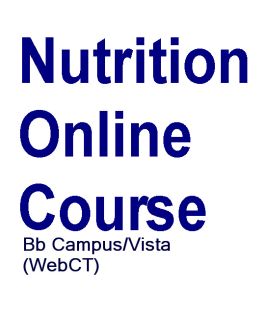LSC Introduction to Nutrition (Online Course WebCT)
1st Edition
0073341371
·
9780073341378
© 2008 | Published: March 12, 2007
This course is designed to provide students with an overview of the relationship between nutrition and the functions of each system in the body. The components of a healthy diet and the physiology of the digestive system are examined. The importance …
Read More
Request Review Access
Receive via shipping:
- Print bound version of the complete text
Topic 1 Nutrition and You
Classes and Sources of Nutrients
The Need to Eat
Scientific Research to Determine Nutrient Needs
Nutrition and Changing Lifestyle
Topic 2 Designing a Healthy Diet
What Is a Healthy Diet?
Nutritional Assessment
Diet Plans
Food Labels
Topic 3 Human Physiology
Cell Biology
Physiological Systems
The Digestive Process
Common Problems with the Digestive System
Topic 4 Carbohydrates
Types of Carbohydrates
Carbohydrates in Foods
Digestion and Absorption of Carbohydrates
Health Concerns Related to Carbohydrate Intake
Topic 5 Lipids
Types of Lipids
Lipids in Foods
Digestion and Absorption of Lipids
Health Concerns Related to Lipid Intake
Topic 6 Proteins
The Building Blocks of Proteins: Amino Acids
Proteins in Foods
Digestion and Absorption of Proteins
Functions of Proteins
Topic 7 Vitamins
Fat-Soluble Vitamins
Water-Soluble Vitamins
Digestion of Vitamins
Vitamin Supplements
Topic 8 Water and Minerals
Functions of Water
Classification of Minerals
Functions of Minerals
Mineral Deficiency and Excess
Topic 9 Nutrition in Pregnancy and Lactation
Diet During Pregnancy
Common Problems in Pregnancy
The Process of Lactation
Advantages of Breastfeeding
Topic 10 Nutrition from Infancy Through the Teenage Years
Nutritional Needs of Infants
Nutritional Needs of Preschoolers and School-Age Children
Nutritional Needs of Teenagers
Topic 11 Nutrition in Adulthood
Nutritional Needs of Young and Middle-Aged Adults
Nutritional Needs of Older Adults
Topic 12 Fitness and Weight Control
Energy Balance
Weight Estimation
Fitness and Nutrition
Treatment of Obesity
Popular Diets
Topic 13 Food Safety
Prevention of Foodborne Illness
Treatment of Foodborne Illness
Food Additives and Pesticides
Environmental Contaminants
Topic 14 Eating Disorders
Healthy Attitudes Toward Food
Anorexia Nervosa
Bulimia Nervosa
Some More Eating Disorders
Topic 15 Review
This course is designed to provide students with an overview of the relationship between nutrition and the functions of each system in the body. The components of a healthy diet and the physiology of the digestive system are examined. The importance of carbohydrates, lipids, proteins, vitamins, water, and minerals are explored. Nutrition needs throughout the human development life cycle are described. Other topics include fitness and weight control, food safety, and eating disorders.
After completing this course, students will be able to:- Describe the characteristics of essential nutrients and evaluate the use of scientific research to determine nutrient needs.
- Examine the various factors that make a healthy diet and design menus using MyPyramid and Dietary Guidelines.
- Delineate the relationship between nutrition and the functions of each system of the human body.
- Outline the functions of proteins and discuss the effects of deficiency and excess intake.
- Evaluate the nutritional role and deficiency symptoms for each vitamin.
- Assess the importance of water and minerals to the human body.
- Evaluate the nutrient needs of adults and older adults.
- Describe problems associated with obesity and discuss how it can be treated.
- Discuss healthy ways to buy, prepare, cook, and preserve food.
- Outline the causes and effects of a few eating disorders and discuss the possible modes of treatment.
- Outline the health concerns related to carbohydrate intake.
- Assess the health concerns related to lipid intake.
- Suggest dietary recommendations for normal growth and development for infants, preschoolers, school-age children, and teenagers.
- Recommend a food plan to be followed during pregnancy and lactation.
After completing this course, students will be able to:- Describe the characteristics of essential nutrients and evaluate the use of scientific research to determine nutrient needs.
- Examine the various factors that make a healthy diet and design menus using MyPyramid and Dietary Guidelines.
- Delineate the relationship between nutrition and the functions of each system of the human body.
- Outline the functions of proteins and discuss the effects of deficiency and excess intake.
- Evaluate the nutritional role and deficiency symptoms for each vitamin.
- Assess the importance of water and minerals to the human body.
- Evaluate the nutrient needs of adults and older adults.
- Describe problems associated with obesity and discuss how it can be treated.
- Discuss healthy ways to buy, prepare, cook, and preserve food.
- Outline the causes and effects of a few eating disorders and discuss the possible modes of treatment.
- Outline the health concerns related to carbohydrate intake.
- Assess the health concerns related to lipid intake.
- Suggest dietary recommendations for normal growth and development for infants, preschoolers, school-age children, and teenagers.
- Recommend a food plan to be followed during pregnancy and lactation.

